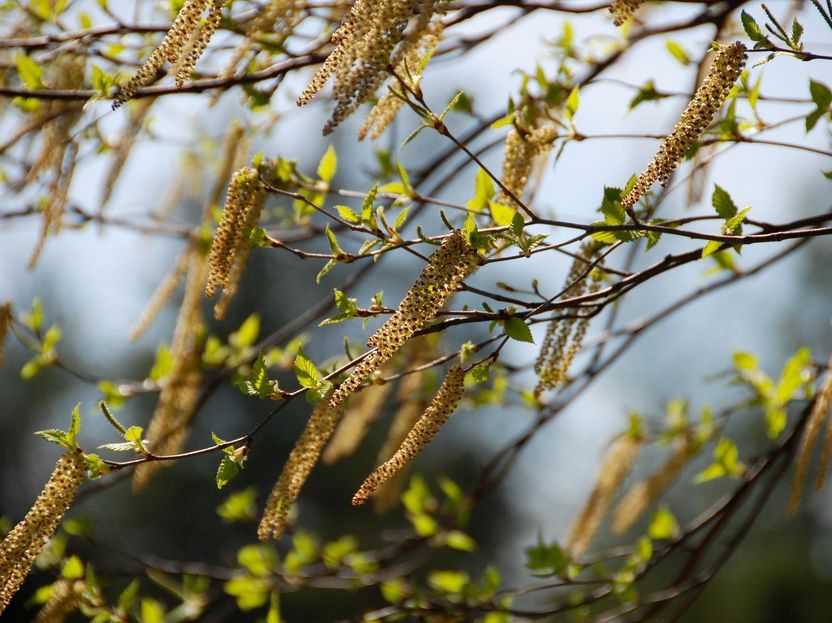How pollen increases susceptibility to virus infection
Researchers describe how birch pollen affects immune cells
Birch pollen is not only a nuisance for allergy sufferers. They can also affect the cells of the innate immune system and make them more susceptible to viral infections. This was now shown by a team of researchers at TWINCORE in Hanover, together with cooperation partners from the University of Augsburg. They published their results in the scientific journal Allergy.

Symbolic image
pixabay.com
From March to May, birch pollen causes problems for many people. The leafy tree with the white bark is widespread in our part of Europe and triggers symptoms such as rhinitis and watery eyes in allergy sufferers. The health of non-allergy sufferers can also be affected by birch pollen. Scientific observational studies have shown a connection between pollen concentration and the prevalence of airway and herpes virus infections.
However, the way in which birch pollen interferes with the immune system was not known until now. A team from TWINCORE in Hanover, in collaboration with researchers from the Department of Environmental Medicine at the University of Augsburg, has now systematically investigated this. "To do this, we treated cultures of human dendritic cells with aqueous pollen extracts and then infected them with human cytomegalovirus, or short HCMV," says Zeinab Fneish, a doctoral student from the Institute for Experimental Infection Research at TWINCORE. "We were able to show that the presence of the pollen stimulates the release of pro-inflammatory signaling molecules." The secretion of the cytokines IL-6 and IFN-alpha were increased in the presence of the pollen.
"This pro-inflammatory environment makes the cells more susceptible to HCMV infection," says Dr Jennifer Becker, a research associate at the TWINCORE Institute for Experimental Infection Research. "Furthermore, when we exposed the cells to the pollen extract for longer periods of time, this susceptibility was even more enhanced."
These findings might play a special role in people with pre-existing conditions. "Asthma patients are very sensitive to the effects of pollen and presence of HCMV or Epstein-Barr virus (EBV) has been connected with severe illness in these patients," says Fneish. "Our results suggest that infection with HCMV or reactivation of dormant HCMV could occur more easily due to the exposure with pollen," says Becker.
Project leader Prof. Ulrich Kalinke, Director of the Institute for Experimental Infection Research and Executive Director of TWINCORE, is particularly pleased with the cooperative nature of the research project. "Our cooperation partners Prof. Claudia Traidl-Hoffmann and Dr. Stefanie Gilles from the Department of Environmental Medicine at the University of Augsburg are the experts on pollen," says Kalinke. "We then used their pollen extracts in our infection models."
Original publication
Original publication
Zeinab Fneish, Jennifer Becker, Felix Mulenge, Bibiana Costa, Luise Krajewski, Veronica Duran, Annett Ziegler, Vivien Sommer, Claudia Traidl-Hoffmann, Stefanie Gilles, Ulrich Kalinke Birch pollen extract enhances human cytomegalovirus replication in monocyte-derived dendritic cells Allergy (2022)
Organizations
Other news from the department science

Get the life science industry in your inbox
By submitting this form you agree that LUMITOS AG will send you the newsletter(s) selected above by email. Your data will not be passed on to third parties. Your data will be stored and processed in accordance with our data protection regulations. LUMITOS may contact you by email for the purpose of advertising or market and opinion surveys. You can revoke your consent at any time without giving reasons to LUMITOS AG, Ernst-Augustin-Str. 2, 12489 Berlin, Germany or by e-mail at revoke@lumitos.com with effect for the future. In addition, each email contains a link to unsubscribe from the corresponding newsletter.
Most read news
More news from our other portals
Last viewed contents



















































